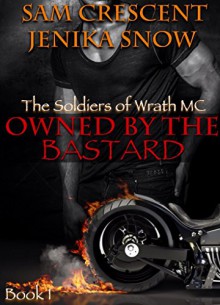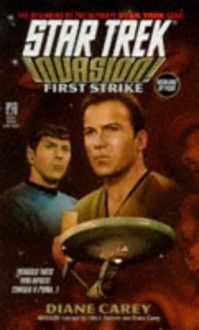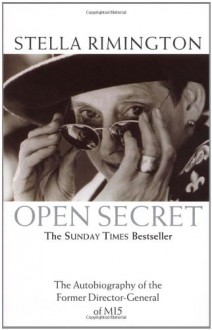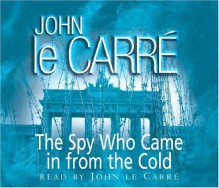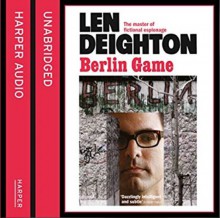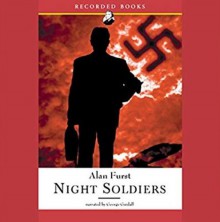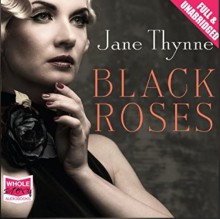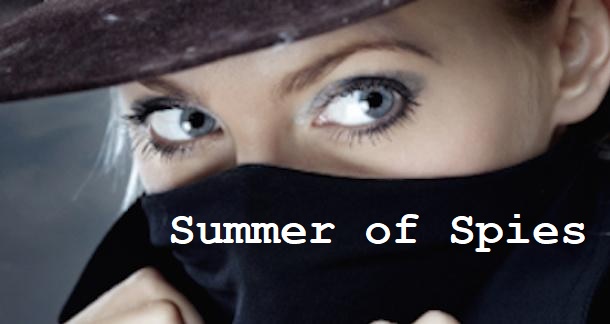
Memorial Day Weekend -- Labor Day 2018
The Books:
Fiction
Eric Ambler: The Mask of Dimitrios (new / print) ****
Phyllis Bottome: The Lifeline (new / ebook-to-printed-PDF) ***1/2
John le Carré: The Tailor of Panama (revisited on audio, narrated by the author) ****1/2
Agatha Christie: N or M? (revisited on audio, narrated by Samantha Bond) ***
Agatha Christie: They Came to Baghdad (new / audio, narrated by Emilia Fox) ***1/2
Paulo Coelho: The Spy (new / English print version + German audio, narrated by Luise Helm and Sven Görtz) ***1/2
Len Deighton: Berlin Game (new / audio, narrated by James Lailey) ****
David Downing: Zoo Station (new / print) ****
Alan Furst: Night Soldiers (new / audio, narrated by George Guidall) ****1/2
Graham Greene: Our Man in Havana (audio, narrated by Jeremy Northam) ****1/2
Graham Greene: The Captain and the Enemy (audio, narrated by Kenneth Branagh) ***1/2
Rosalie Knecht: Who Is Vera Kelly? (new / audio, narrated by Elisabeth Rodgers) ***1/2
Helen MacInnes: Above Suspicion (new / print) ****1/2
Francine Mathews: The Cutout (new / audio, narrated by Trini Alvarado) **1/2
Valerie Plame Wilson, Sarah Lovett: Blowback (new / audio, narrated by Negin Farsad) ***
Jane Thynne: Black Roses (new / audio, narrated by Julie Teal) ****
Patricia Wentworth: The Traveller Returns (new / print) ****
Kate Westbrook: Guardian Angel (new / audio, narrated by Eleanor Bron) ***1/2
Emmuska Orczy: Adventures of The Scarlet Pimpernel
The Scarlet Pimpernel (revisited on audio, narrated by Stephen Crossly) ****1/2
I Will Repay (new / audio, narrated by Johanna Ward) ****
John Le Carré: George Smiley Cycle
The Spy Who Came in From the Cold (revisited on audio, narrated by the author) *****
The Looking Glass War (new / audio, narrated by Michael Jayston) ***1/2
Smiley's People (revisited on audio, narrated by Michael Jayston) *****
Stella Rimington: Liz Carlyle Series
Secret Asset (new / audio, narrated by Rosalyn Landor) ****
Illegal Action (new / audio, narrated by Emma Fielding) ****
Ian Fleming: James Bond Series
Quantum of Solace (short story only; new / audio, narrated by David Rintoul) *1/2
Dr. No (new / audio, narrated by Rufus Sewell) ***
Nonfiction
Stella Rimington: Open Secret: The Autobiography of the Former Director-General of MI5 (new / print edition) ****
Peter Finn & Petra Couvée: The Zhivago Affair (new / audio, narrated by Simon Vance) **1/2
Valerie Plame Wilson: Fair Game: How a Top CIA Agent Was Betrayed by Her Own Government (new / audio, narrated by the author) ****




Mission Assessment:
Loads of fun; thanks to Moonlight Reader Madness and Wanda for coming up with the idea! In addition to advancing my "Women Writers" project because of a certain focus on the Women of Intelligence, I've discovered several new writers and series to take a closer look at, reconnected with some "old familiars", got to take a trip down memory lane to Cold War-era Berlin, got to travel the world and back in history -- from revolutionary France to WWII era (plus pre- and post-WWII) Iraq, Turkey, the Balkans, Russia, Spain, France, Britain, Austria, and Germany, and post-WWII as well as more recent Latin America and the Caribbean -- and I've seen some of my literary prejudices pleasantly upended (looking at you, Dame Agatha and They Came to Baghdad); even if others were, however, unfortunately confirmed (looking at you, Mr. Fleming).
Side note: My personal library now needs a new, separate "espionage" shelf: Lumping in spy books with mysteries, thrillers, and other suspense fiction clearly won't do any longer ... they've just grown too numerous for that sort of approach. Ah, well. A serious reorganization is overdue anyway -- I've only got to find the time for it ...
The Hits:
* Emmuska Orczy's Adventures of the Scarlet Pimpernel. The first book was a revisit, but I finally got around to reading book 2, which -- though not chiefly focused on Sir Percy and much more overtly a romance than book 1 -- confirms why this whole series has a loyal following to this day. And of course, it gets kicked onto yet another level once Sir Percy makes his appearance. I'm sort of familiar with some of the later entries in the series, but I'm now going to make a concerted effort to read the whole thing in order.
* John le Carré's Smiley Cycle and Tailor of Panama. This was largely a revisit, too, but I just can't help it -- nobody writes spy fiction like Mr. Cornwell. Even Stella Rimington, the ex-"K" (head of MI5) herself, acknowledges that he gets it right ... and although he does have the odd duds, when he hits the spot, he's second to none.
* Stella Rimington's autobiography and Liz Carlyle series. Speaking of "K" (also likely the inspiration for Judi Dench's "M" in the Bond movies), even though her autobiography is necessarily short on detail as far as actual secret service operations and policy are concerned, it gives great insights not only into her personal history but also into the actual work done by MI5 (and to a lesser extent, MI6, and secret service organizations in general), particularly in the final four decades of the 20th century. Moreover, like le Carré, she has very successfully capitalized on her experience and translated it to fiction. Rimington can write -- both fiction and nonfiction -- and her autobiography and fictional series nicely complement each other in providing an even greater understanding of "the business of spying" in days past and present. (In the first Liz Carlyle book, At Risk, which I read -- and liked -- a few years ago, she was maybe still in the final stage of finding her voice, but both Secret Asset and Illegal Action, Liz Carlyle books 2 and 3, are fine examples of mature writing that clearly draw on Rimington's personal experience.)
* Helen MacInnes: Where has this author been in my life until now? Once more thank you to Moonlight for bringing her to my attention. I immensely enjoyed the one book by her that I read during the Summer of Spies -- Above Suspicion -- and have already ordered several more (the three Colin Grant books plus Accident in Place). Great historical and political insight and characters that you can easily (and very much want to) empathize with, all built into a suspenseful narrative arc -- what more can you possibly ask for?
* Len Deighton: Between his Berlin Game and le Carré's Smiley books, man, what a trip down memory lane to Cold War Berlin. And Deighton, like le Carré, gets it exactly right, down to individual Berlin locations and settings (I was tempted to compile a post just on those at one point), life style, attitudes, you name it. Another author I'm definitely going to follow up on in the future.
* The group read of Agatha Christie's They Came to Baghdad. What a fun group read that turned out to be! I'm not the biggest fan of Christie's spy fiction (most of it -- especially the books where she actually "means it" -- range between somewhat unrealistic and completely over-the-top-and-out-there preposterous), but if, like here and in The Secret Adversary (as well as some of the stories in Partners in Crime), she decides to poke fun at the genre, she can be very entertaining indeed. At one point I thought the plot of They Came to Baghdad was going to veer off in the same direction as that of Destination Unknown, which has to be one of her worst books ever, albeit not counting those she wrote in the last years of her life, but fortunately my fears were unfounded. If only she'd written more spy books like this one!
* Patricia Wentworth's The Traveller Returns. Speaking of Golden Age mystery novelists trying their hands at spy fiction, I'm tempted to point to Ms. Wentworth's contribution to the genre and tell the rest of them -- the whole lot, from Christie to Marsh, Allingham and beyond: "See: This is how you do it!" For the first half or so, the book looks like a simple variation on the Martin Guerre theme, which I confess is not one of my favorites, but just when I thought I was going to be somewhat underwhelmed, the spy element kicked in and we were off to a whole lot of fun. So, many thanks to Tigus for yet another great "Miss Silver" recommendation!
* Jane Thynne's Clara Vine series. A huge shout-out to Mike Finn for mentioning this -- yet another series I have every intention to follow up on after having read the first book (Black Roses). Extremely well-researched and well-written; easily on par with David Downing's much more acclaimed Zoo Station (which is likewise chiefly set in Nazi-era Berlin). Now if only they'd picked an audio narrator who had actually put some effort into finding out how to pronounce the multiple German words and place names figuring in the story ...
* The Carribbean and Latin American setting. I confess I'm not particularly drawn to Greene's African fiction and only a minority of those books of his set in England, but I have a soft spot for his fiction set in the Carribbean and in Latin America. In part, surely, that's because I have a penchant for that part of the world anyway, but those particular books by Greene also have more of a pull on me topically -- I suppose I'm just more interested in reading about the morality and choices associated with politics and the economy (read: corruption) than with the morality of purely personal choices (read: religion) ... at least where it comes to Greene's writing. (It certainly also helps that the particular Carribbean branch of this easily lends itself to satire -- it's not a coincidence that le Carré's Tailor of Panama covers large parts of the same ground as Our Man in Havana, and from a very similar writerly perspective, too.) -- Rosalie Knecht's Who Is Vera Kelly? provided for an interesting and well-written additional side light in its focus on Argentina and the Malvinas / Falklands, from the point of view of a heroine who is coming to terms with her personal history at the same time as she is trying to decipher what is happening in the country where she has been sent. (Another shout-out to Mike Finn for finding this one.)
* The Bond Connection. By which I don't mean Fleming's books themselves, but those books (all written by women) unearthed by BrokenTune -- one more shout-out! -- as tangentially related to Ian Fleming and his super-spy, all of which turned out vastly more engaging and entertaining than Fleming's own: Phyllis Bottome's The Lifeline, the book that is said to have inspired the creation of James Bond's character (and which incidentally bears a certain superficial topical likeness to Helen MacInnes's Above Suspicion, in likewise featuring its English protagonist's involvement with an underground resistance network in Nazi-occupied Austria), and Kate Westbrook's Moneypenny Diaries, which intelligently use both Ian Fleming's real biography and the plots of some of his James Bond novels for a series of three spinoffs interweaving a look back from present-day England to what might have happened if Jane Moneypenny had been more than M's faithful secretary ... and eternally, fruitlessly infatuated with Bond.
* The "Eastern Theatre". Since most spy fiction (well, at least most spy fiction published in English or German) focuses on what, post-WWII, would be considered a Western perspective, I made a certain point to also include books -- albeit written by Western writers -- set in pre-WWII Russia, the Balkans, and Turkey (in addition to Christie's They Came to Baghdad, that is). Although I am familiar with the general interwar history of those countries (and areas), Eric Ambler's Mask of Dimitrios and Alan Furst's Night Soldiers filled a lot of gaps, and I also liked the fact that both of them deliberately chose organizations other than a Western intelligence service as their focal point. Plus, both of them include extended sections in Paris / France (as well as Civil War Spain, in Night Soldiers) -- the city of cities when it comes to WWII intrigue (with the possible exception of Lisbon).
* Valerie Plame Wilson: Fair Game. The subtitle of Plame Wilson's memoir ("How a Top CIA Agent Was Betrayed by Her Own Government") sounds more than a bit sensationalist, but in fact, in the current crazy political climate her experience seems more on point than ever and serves as a healthy reminder that the power structures currently at play didn't fall from the sky in January 2017: at their core, they were already in place in the early 2000s, and it's certainly not a coincidence that one of the first persons to be pardoned post-2016 was Scooter Libby.
The Misses:
* Ian Fleming. Not that this one was unexpected; the early Bond movies alone (and in particular), for however great liberties they may be taking with the plotlines, make it clear that the books are bound to brim with casual and not-so-casual sexism and racism. Both of these are innately written into Bond's character. Fleming was a talented writer; I'd just wish he'd employed his talents somewhat differently.
Peter Finn & Petra Couvée: The Zhivago Affair. Oh, I had so much higher hopes for this one. A look at how the CIA used Pasternak's Dr. Zhivago in their subversive activities in Russia in the 1960s and 1970s and at the American and Russian inforwars of the day -- what's not to like, right? Except that ... the vast majority of this book actually consists in a biography of Boris Pasternak and an extended work history of Dr. Zhivago, with a detailed analysis how Pasternak drew on his personal life experience (and the real life people in his life) in creating the novel. Only in the second half of The Zhivago Affair do we even get to the CIA's involvement (the actual story how the manuscript was smuggled into the West occupies a mere few pages of the preface) -- and even there, while the Russian-American infowars are covered in some detail, the better part of the focus still seems to be on Pasternak himself, and on how the Russian government treated him as a result of the publication. Also, while the authors do seem to have had access to (and cite in the annex) certain previously unpublished sources, the vast majority of the material they're using is not only not new, it's easily accessible in major libraries and online. All in all NOT, therefore, the new and unprecedented focused analysis of the CIA's activities and the Cold War infowars promised in the book's subtitle ("The Kremlin, the CIA, and the Battle Over a Forbidden Book") and in its advertising. -- As a side note, my enjoyment might at least have been marginally enhanced if the audio narrator had been anyone other than Simon Vance.
Francine Matthews's The Cutout. A fairly ludicrous plot, set in Germany and various Eastern European countries and written by an American author who seems to have spent her entire time in the region concerned among Americans. The name-dropping of streets, tourist attractions and other random geographical features replaces the genuine building of atmosphere and setting, and "the locals'" actions, reactions and attitudes are built straight from cookie cutter cliché -- if Mattews ever had any in-depth conversations with anybody in the areas where she was posted as an agent, she obivously learned nothing at all from them (or she is completely unable to translate what she learned onto the page). This is a shame, because her book (published in the early 2000s) actually has an interesting and timely premise: A Germany and Eastern Europe where the neonazis are on the rise.
Valerie Plame Wilson & Sarah Lovett: Blowback. Plame Wilson shows in her autobiography that she clearly can write, but either (unlike Stella Rimington) she had trouble translating that ability into fiction writing or she was talked into some pretty nonsensical plot and character choices by her co-author Sarah Lovett (or by an editor). I'd almost DNF'd by the time the book finally gained a sense of direction and of "self" -- and I was brought to thinking about quitting not least when I hit a big boo-boo that Plame Wilson, as an ex-CIA agent, really ought to know better.
(There is a character clearly modelled on Stella Rimington, down to the fact that this character is the [fictional] director of MI5 ... only trouble is, this character gets involved, on the British side, with a CIA operation against a foreign government and on the ground in that foreign [Middle Eastern] country -- i.e., an operation that is neither within the remit of domestic intelligence in Britain nor in America, and which would therefore have to be handled by MI6 in the UK, not by MI5. Since Rimington's autobiography was one of the books I'd just recently finished by the time I got to Blowback, this authorial snafu was impossible for me to miss, and it instantly made me question what other inaccuracies might be contained in Plame Wilson's & Lovett's book.)
(spoiler show)
Still, Blowback did find its feet towards the end at least in terms of the thriller element, so I at least won't entirely rule out reading its sequel -- maybe it simply took Plame Wilson a while to translate her nonfiction writing skills to fiction. I just hope I won't run into any more errors of the kind that she really should know better.
All in all, though, the number of my Summer of Spies "misses" is infinitesimally small compared to its many hits. So I'm going to declare this project a rousing success and right on target!




 Log in with Facebook
Log in with Facebook 
